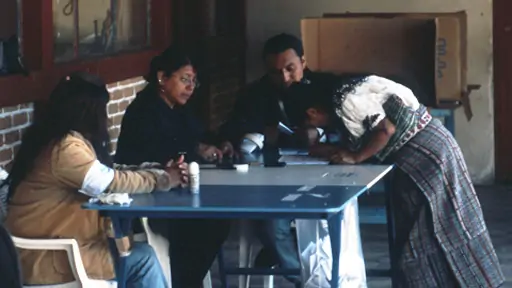Indigenous Calendar July, 2014: K'iche' Maya Democracy, Guatemala

Guatemala's most recent Presidential election took place in 2011. It was, officially, at least, a free-and-fair, democratic election, yet not without controversy. The victor, Otto Pérez Molina, became the first former military officer to hold the position since the end of the civil war. Twenty-nine years earlier Guatemala was in the middle of that war, which would last a total of thirty-six years: People were dying (some estimates claim as many as 250,000) instead of voting. On March 23, 1982, José Efraín Ríos Montt seized presidential power in a military coup, holding that office only for about sixteen months. Almost thirty years after that he was indicted in a Guatemalan court for genocide.
The population of Guatemala is made up of about 40% indigenous peoples. During the civil war there was a lot of suspicion that this 40% of the population was largely sympathetic to — or even active in — the cause of the guerillas.
Ríos Montt was convicted of genocide by the Guatemalan judicial system in May, 2013. Although aged 86 at the time, he was sentenced to 80 years in prison. Ten days later that ruling was overturned and the trial reset. It might continue in 2015.
In reaching its initial, guilty verdict the court considered, in particular, evidence of genocide that targeted the Ixil Maya people. They live near the town of Chichicastenango, in small, isolated communities not far from one of the civil war-era guerilla operational bases. Ríos Montt is said to have personally ordered the killing of 1,771 Ixils.
Guatemala has held "free-and-fair, democratic" elections since the civil war ended in 1996. The turnout of its indigenous population has generally been low. We could speculate why this might be: perhaps it's a result of less formal education traditionally afforded the indigenous population; perhaps it's a language issue (many of the country's indigenous population speak Spanish only as a second language and some don't speak Spanish at all). It should not surprise us, given the above events, that it might also be a trust issue.
I took this photograph in Momostenango in western Guatemala in 2007. The occasion was the run-off for the previous Presidential election (which Pérez Molina lost). The woman about to cast her vote is K'iche' Maya. Momostenango is not far from Chichicastenango. So, although this woman speaks a different language from the Ixil, she may personally know of Ixil Mayas who suffered at the hands of the government all those years ago.
The K'iche' Maya are featured in our documentary, Ancient and Modern Mayan Peoples.
If you enjoyed reading this article, please consider supporting independent, advertising-free journalism by buying us a coffee to help us cover the cost of hosting our web site. Please click on the link or scan the QR code. Thanks!


